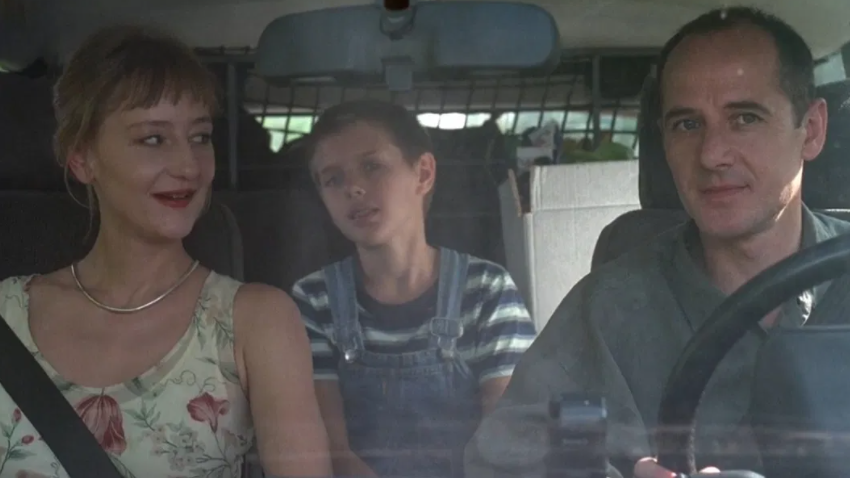Funny Games
1997

Rated: NR
Genre: Crime, Thriller. Drama, Horror
Country: Austria
Run-Time: 1h 49min
Director: Michael Haneke
Cast
Susanne Lothar……….Anna
Arno Frisch…………………Paul
Ulrich Muhe……………….Georg
Frank Giering…………….Peter
When Michael Haneke’s Funny Games was released in 1997, it was obvious there was something special about the film. Haneke, who had previously filmed The Seventh Continent, had already gained a reputation for making mature, often very disturbing films. Haneke’s films may not be horror in the traditional sense, but there is no doubt that horror themes and elements are often included. In many ways, Haneke is one of the pioneers of that sub-genre of more adult, mature horror like Antichrist or Irreversible, even though he would personally object to the use extreme content.
Funny Games is about an Austrian family that has just returned to their summer home after some time away. While settling in, Anna gets a visit from a young man named Peter asking for some eggs. The man is not known to Anna, but the neighbour who has supposedly run out of them is, so Anna lets the man in. Anna generously gives the man the eggs, but he drops them. This initial act of clumsiness then spirals for one incident to another until it becomes clear that Peter, and his friend Paul who arrives a little later, have no intention on leaving Anna and her husband’s home anytime soon. And they have some terribly sadistic ideas on how to pass the time.
Although Funny Games was originally a German-language film directed by Haneke, many people in North America are probably more familiar with the Haneke’s 2007 English remake starring Naomi Watts and Tim Roth. Although the remake is almost an identical shot-for-shot clone of the 1997 version, I suggest that you see the original unless you absolutely can not stand subtitles. There is an authenticity to the original performances and the fact that the Lothar and Muhe (who were really a couple) are not well-known names gives the film an added sense of credibility. In other words, the original gives you more of a sense that this could happen to you and your family.
One thing that stands out about Funny Games is how impressively modern this movie feels. Haneke uses a soundtrack that moves between timeless classical pieces and un-evolving sound of death metal. Also, the too clean, smarmy prep-school look of Peter and Paul still resonates today, as it is the iconic look of rich, pampered youth. But Peter and Paul probably don’t actually come from wealth. In fact, we never actually know for certain what they are or what motivates them. They are enigmas and that gives their terrible invasion an extra layer of nihilistic dread.
But Funny Games also has touches of innovation and experimentation. The tone is realistic and dead serious, most of the time. But then Peter, who Frank Giering plays to creepy perfection, will break the fourth wall, and give us a knowing wink. Later, he talks directly to the audience like a Bizzaro Ferris Bueller, encouraging us to keep watching and promising a spectacle. This power to address the audience and then slip back into his role is his alone and it makes him uniquely engaging as a villain. Paul, and Haneke intentionally subvert our expectations of the thriller genre without ever having to rely on a creating needlessly convoluted plot. Instead, we watch as the camera follows characters who are away from the action, allowing sounds in the background to relay the horrors. And then there is that completely innovative, almost violating, ten-minute long shot placed at a unconventional point where other directors might simply cut away. Some of the techniques Haneke employs still seem ground-breaking nearly twenty-five years later.
I have seen interviews with Haneke where he has stated that part of his objective with Funny Games was to make audiences contemplate their desire to see a film where a family is slowly tortured. My own feeling on this is if you use violence in a film- even in a limited capacity- to try to make statement against the glorification of violence, you are not going to fully achieve your directive. (I think back to the first chapter of Slaughterhouse-Five, when Kurt Vonnegut acknowledges the near impossibility of writing an anti-war novel set during the war that would not unintentionally glamourize it.) Thus, I can understand why people might criticize the film if they were to evaluate it only on how well Haneke accomplished his often-vocalized objective. But regardless of this, the way in which violence is handled in this film, if nothing else, is particularly self-aware. In fact, Funny Games feels like such a raw, emotional experience that it is only when its finished do you realize how remarkable little violence Haneke actually showed. Haneke structured the film in a way that gives extra weight to the violence we do see…and even the violence we don’t. Filmmaker’s can learn from this.
Funny Games is not just any home invasion movie; it is the most meta-cognizant home invasion movie that has ever been made, and it helped inspired the next generation of filmmakers to try new things with the intruder formula, even though even the best efforts still end up looking somewhat pedestrian by comparison. There is a maturity to Funny Games that has never been replicated. By constantly pulling the rug out from under audience’s expectation, Haneke succeeds in making a superior, unparalleled (disregarding his very similar American remark) home invasion film that is lightyears ahead of its time. Let me be frank. No other home invasion film has been, and likely will ever be, as thought provoking as this one.
